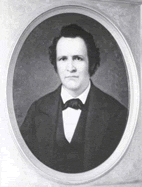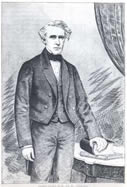|

<<
Back
In
his booklet Indiana Asbury University-DePauw University: A History,
Irving Frederick Brown of the class of 1914 wrote the following
account of the Curry riots.
The weekly holiday of the school at this time came on Saturday,
and for this reason the [literary] society meetings were held on
Friday night. After the meetings, the members would sometimes get
out and engage in somewhat boisterous fun around the streets, before
dispersing for the night. On October 17, 1855, the faculty passed
a resolution requiring the societies to hold their meetings on Friday
afternoon, and prohibiting such disturbances as they had been causing.
President Curry and the faculty claimed that the sessions were protracted
to very late hours-usually until after ten o'clock, and not infrequently
until nearly midnight-thus endangering the morals and health of
the young men, breaking in upon their regular habits, and bringing
the college property into increased danger of fire. They also said
that the meetings were the occasions of serious disorder, both within
and without their halls. The students objected to the above resolutions
on the ground, first, that many of their number, who were self-supporting,
used Friday afternoons for their work, and, second, that such a
plan had been tried and found impracticable. They petitioned the
faculty to reconsider their action, but in vain.
 
They then said that they would not meet at all, rather than in the
daytime, and both societies accordingly adjourned sine die. A few
days later a meeting of students and faculty was called, at which
time the students were allowed to present their view of the matter
and give their reasons for dissenting. At this meeting they denied
all the charges that the faculty had made. The students told the
faculty that the meetings rarely varied more than ten minutes either
way from ten o'clock, and that only two or three times during the
last five years had they been extended beyond eleven o'clock. Moreover,
there had never been an accident from fire; and as to the immorality
of such a thing, it was better to spend their evenings in literary
pursuits, than to spend them in such public resorts as the town
afforded. This meeting, however, only made matters worse. On October
25, about one hundred of the students gathered together in what
was known as Seller's woods, or in the student term of the time,
"Sylva Selleris," which was on the site of McKeen field.
Here they talked matters over, and decided that, whatever should
happen, they would all stick together. President Curry had, in the
meantime, declared the college to be in a state of rebellion, and
on Tuesday, October 28, he presented to the students a pledge, on
which they were given twenty-four hours to deliberate. At the end
of that time, if they decided to accept it, they could remain in
school, but if they did not, they were to be suspended.
 
When the roll was called the next morning at chapel, nineteen answered
"yes," eighty-one "no," nineteen asked for further
time, and nine were absent. The final result was the suspension
of the entire senior class-twenty-two in number-six out of eight
juniors, eight sophomores, twelve freshmen, and twenty-nine scientifics.
Some went home, some were later allowed to reenter, and some went
to other schools, but in later years nearly all of the senior class
were enrolled as alumni of the University. This rebellion led directly
to President Curry's resignation in July of the following summer.
Back
to Top
<< Back
|





